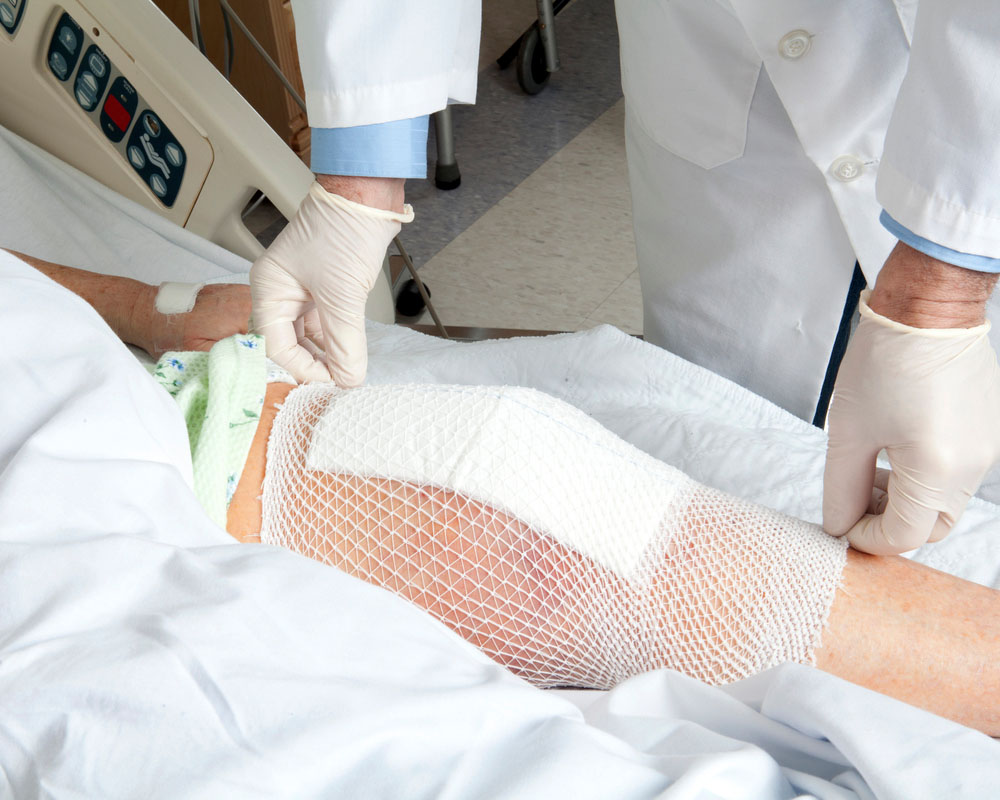Risks and Complications of Knee Replacement Surgery

KNEE REPLACEMENT SURGERY (ARTHROPLASTY)
Joint surgery is not an easy decision to make. While the potential patient wants to get back the mobility of their youth and eliminate chronic pain, there are many factors to consider when looking at joint surgery. This applies not only to the surgery itself, but to the long recovery process with no guarantee of full mobility or significant pain reduction.
This article discusses knee surgery and the different elements associated.
Knee Replacement Surgery is required when you have a worn-out, diseased knee. The process involves removing all the diseased portions and refitting with an artificial joint. The most common problem leading to a knee replacement is osteoarthritis.
The two types of knee surgeries are:
- Total Knee Replacement (both sides of the knee are replaced)
- Partial Knee Replacement (Only one side of the knee is replaced)
Complications Arising From Knee Surgery
- Blood Clots: Blood thinning medication eliminates the clots that may form in the veins in the lower limbs. Clots formed in the lower limbs can cause pulmonary embolism when they travel to the lungs.
- Osteolysis: Sometimes the bone next to the knee prosthetic may get brittle and break due to ions released by wear and tear of the knee implant. This is called osteolysis. To avoid the risk of the surrounding bones getting brittle you must discuss with your doctor in-depth about the safest knee implant to get.
After your knee replacement surgery, it is essential to periodically screen for metal (titanium, chromium, cobalt) ions in your blood stream. - Fracture of implant: After knee implant surgery, there should be a minimum recovery period of at least six weeks before starting your routine. If the patient is in a hurry to be physically active and get back to routine, then he/she may be at a risk of implant fracture. Implant fracture can also occur due to patient being overweight.
- Infection: Infection is a serious after effect of a knee surgery. A mild infection can be treated with antibiotics. In the case of a deep infection the knee joint will have to be taken out until the infection clears. In severe cases, the joint needs to be taken out and the legs are allowed to be fused together so that it no longer bends at the knee.
- Wound Hematoma: Sometimes blood accumulates in a surgical wound resulting in a Hematoma. Bleeding from the wound post-surgery is usually normal for two days.
Sometimes blood gets collected under the skin causing a swelling. In some cases, this swelling needs to be discharged surgically. - Pain: Pain is an inevitable part of post-surgery. In the first few months after surgery, pain subsides. But for about 10%-20% of the patients, there is moderate to severe pain throughout. This is an unexplained condition and is termed as Complex Regional Pain Syndrome. It can be handled through pain management.
- Stiffness: Stiffness can be resolved through exercise and physiotherapy. It is highly recommended that the pain management medication must be administered as prescribed, for the patient to move about and let the recovery process take place. The only factor stopping the physical treatment is the internal pain. So, pain management along with physical exercise can resolve stiffness.
Alternatives to Knee Replacement Surgery
If the aforementioned risks and the long recovery time leave you with doubts about proceeding with knee replacement surgery, there are alternatives.
One of those alternatives is knee regenerative medicine. Using advanced amniotic cell therapy, regenerative medicine can repair and rebuild joints and eliminate pain without the risks or recovery time associated with surgery.
Schedule a Consultation Today!
Recent Posts

BMI and Weight Loss: Understanding the Impact on Health
Body Mass Index (BMI) serves as a widely used tool for assessing weight status relative to height, offering valuable insights

Faqs About Regenerative Medicine and Stem Cell Treatment
Common-faqs-regenerative-medicines-and-stemcell-treatment

Five Habits that Could Be Worsening Your Knee Pain
Five Habits that Could Be Worsening Your Knee Pain

Regenerative Medicine Treatments for Tennis and Golfer’s Elbow
Overuse and repetitive contractions of the muscles and tendons of the forearm ...



